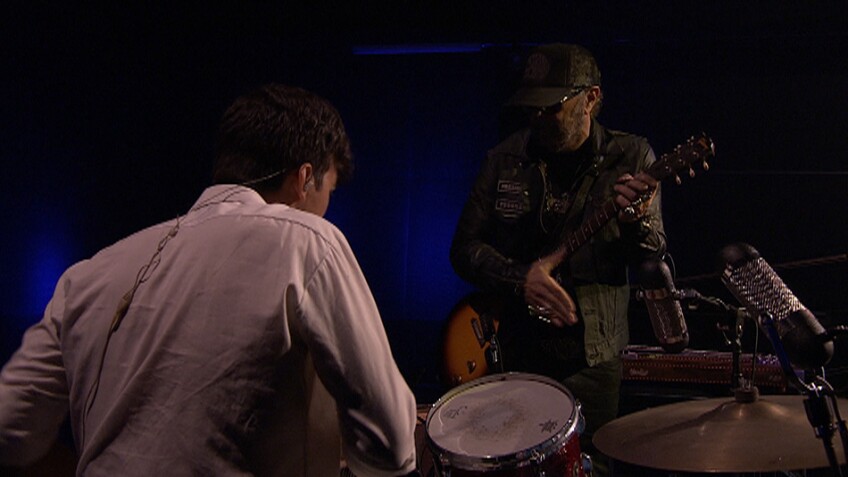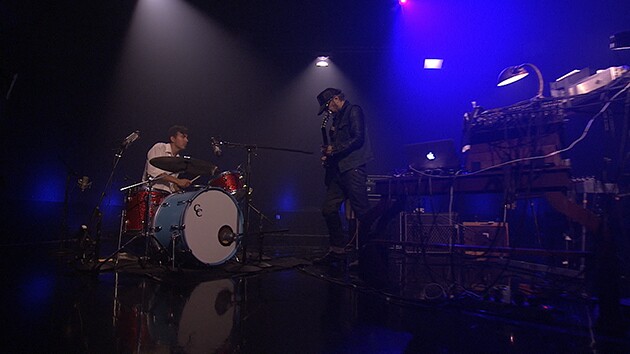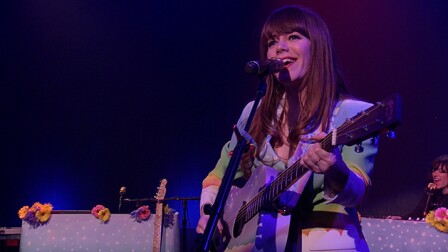
First Person: Daniel Lanois
As a session musician, Daniel Lanois has played guitar with everyone from Fiona Apple and Conor Oberst, to Lana Del Ray and Pink. Lanois stops by Studio A for a solo session featuring his soulful guitarwork and vocals, interweaving folksy Americana with subtle blues sounds.
Discover more about Daniel Lanois in his own words.
On His Multiple Collaborations
I have been very fortunate to have had chance to work with a lot of smart and talented people and I have walked away with every project with a little something special. I enjoyed my time in Ireland with U2, very smart people, very spiritual people. And so I think about them when I do my own work, I wonder what the guys in Ireland would think of this, they become a point of reference for a standard of quality. I sat next to Bob Dylan for the making of two of his albums and they are really good albums to this day.I cherish those times with Bob and by proximity one absorbs information to be sitting next to the man himself certainly has elevated my appreciation and capacity for better lyric and I've hung out with Leonard Cohen. I said "Leonard, How did you get started?" He says "well, I went on a lyrical pilgrimage when I was a kid, I went to Ireland then I went here then I went there." He just packed up the bag and he went out there to find the word for himself, so it is a reminder about if not specifically about going out there to meet poets, to get out there and find something, find your own voice and find your passion. I have worked with the Neville Brothers and I still hear the haunting voices of the brothers in my head. Aaron Neville one of the great singers of America was kind enough to sing on my first record. I'll never forget the lessons I've learned in New Orleans about the bass because I am a Canadian kid, we were great with melodies and storytelling but was not the bass central of the planet, whereas New Orleans a lot had come from there in the bass department so I went there to learn the bottom end. The tuba lines and the funk bass lines and the jazz. My travels, geographical ones, and other wise travels into people's minds has really allowed me to broaden my scope and to make me a better musical mind, [and] a better human being.
On The Album "Flesh And Machine's" Relationship To The Studio
My new record "Flesh and Machine" represents my devotion to the laboratory, my sound laboratory. I decided to include a lot of what I do on this record with the view of then taking it to the stage, of taking it to the live setting. What we are doing here today is an indication of where my passion lives with the development of sound. I wake up every morning with new sound ideas in my head and we try to put them together in the laboratory, so this is kind of a dream come true this record.
On The Studio As An Instrument
More and more I am seeing my studio as an instrument. Quite specifically there is a song called "Opera" on my record and also on the show where the melody happens, that's actually a sample of my voice that we laid into the multi-track seven different times for seven different pitches and I played the console as if it was a keyboard and I brought the melodies in as I needed them. So, it is a way of creating an operatic and melodic sound but that comes from my own voice via the technology
On Technology's Influence On Modern Day Music Making
Technology now is available to everyone. You can go into a music store or an Apple store and come up with the recording equipment needed to make a record. That's pretty fascinating to me because when I was a kid of course I did not have all that, equipment was harder to come by. When I hear something very inventive come out of people's houses because a lot of the exciting new works are cottage industry built. People make them in small rooms in their houses. So I think the availability of gear has allowed a lot of new expression.

On Eno's Influence To His Approach To Music
Yes, of course, some years back I was lucky enough to meet Brian Eno, a great sound specialist and innovator from England and he introduced me to his vision at the time which was ambient music and we made a good few records in Canada over the course of three or four years that were very adventurous records and I was most impressed to his devotion to that direction because it was not a very commercial thing to do. But these records have lived on and are still intact and hold a lot of dignity in these modern times and they have been a source of inspiration for a lot of instrumental artists over the years. The values that we operated by back then are the values that I try and live be today, so that has always stayed with me if not specifically the sounds then definitely the values and devotion.
On The Economic Structuring Of Musical Production
Prior to my meeting Brian Eno, I had to pay the bills of my recording studio so I was doing whatever came through the door. I was engineering or maybe producing so that I can pay off my mortgage. And then once my skills got good and Brian Eno came into my world I did not feel the financial pressure anymore because my mortgage was paid off at that time. I was able to apply my skills to a very devoted man's vision, that would be Brian Eno and I never looked back. The time that we put into that work and the understanding that we had of our equipment. We did not have a lot of equipment but we were masters of a few pieces and that was a big lesson for me too, not consider all options but to get really good at a few things. I always stuck with that philosophy and today on the show here I've only got two to three boxes but I am getting to know them pretty well and so I can do more effective work by being devoted to just a few things.
On His Production Techniques The sounds that excite me the most are the sounds that are human like but not necessarily recognizable sounds. Maybe a bit like the human voice or like the human hands on a cello or human hands on a steel guitar. So my process goes like this, I record familiar instruments: steel guitar, piano, voice and then I mute them so you don't get to hear them in the mix but I draw upon them and sample them, dub them out and it's through this process that I can manipulate the sounds to the point that they are not recognizable but they are emotional and then I spit them back into the tracks at the right moment so that they are harmonically connected. Consequentially, the title on the record called "Sue Look Out" has the sound of animals and people mixed together. It's my attempt at creating a universal language
On The Meaning Of Flesh And Machine
"Flesh and Machine" really stands for the tightrope I've always walked; you know, I am very close to my laboratory but the laboratory would be nothing without the hand played instruments, so it is authenticity if I could use that word for something real within us mixed with the technology and hopefully we get to that place where we can be aiming for the future with music. So that's my criterion quest really is to try and step into the future with my sounds.

On His Early Musical Development
The steel guitar I started playing when I was nine years old. A funny little story, this was back in the day of door to door canvassing and a man knocked on my mother's door and he said "do any kids like music? That want to play music?" She says "Yeah this one here he likes music" and I spoke with the man, I passed the aptitude test and then he said 'Okay, we teach only two instruments: accordion or slide guitar' I said 'Okay, I'll take slide guitar.' I stuck with it ever since, it started out without pedals it was just really an acoustic guitar with very high action played with a little metal bar and I was really hooked on it. I loved it, I walked to my lesson once a week and it was something that really belonged to me. It opened up a whole new arena of dreams and possibilities for me because I didn't play sports and I was not connected with the other kids so this was my avenue. That belonged to me.On His Song "Aquatic"
In this album we have a piece called "Aquatic", and it's done on the steel guitar and it has an underwater sensation to me and I had this image in my head of being submerged and swimming on the Saint Lawrence River to the mouth of the river, to the Atlantic and meeting characters along the way but characters that could not stay because they were drifting with the current so I would say hello, I would wave, maybe a little bit of exchange and then carry on and the river kept getting wider and wider and wider until I got to the expanse of it and I saw the icebergs and the whales, so it represents that journey of going to a deep place if not specifically a deep ocean hopefully a deep place spiritually to know what the next dimension might be.
On The Significance Of The Saint Lawrence River In His Life
Saint Lawrence is the great river that some to Canada and America that feeds the great lakes. The Saint Lawrence is dear to me because I am French-Canadian and the Saint Lawrence was a way the early settlers came to Quebec and New Brunswick and made their way even to the Toronto area. It really suggests, it has an ancient rhythm to it you can not deny when you put your feet in it.
On The Drum's Relationship To Flesh And Machine
I've always appreciated the drums since I was a kid. I'm a drummer myself even though I'm a closet drummer. I have a very high regard for the energy of the drum. It is probably the first musical instrument that we as humans embraced: Started beating on a log. The transmission of it appeals to me because it speaks without words obviously and the energy of it is timeless. Even in modern times we respond to rhythm and we like to move and so this new body of work, some of it is quite rhythmic and I am very excited about this because I've done a lot with melody and chord sequences and now to have an opportunity of beat and rhythm and to feel that primal energy come up through my body, I like it a lot. I choose to work with Kyle Crane he's a great little drummer, I met him at a bar down the street from my studio and I though he had a lot of heart and a lot of passion and it's nice to be in the company of somebody who is a dreamer like me.
On The Listening Experience Of "Flesh And Machine"
It was my desire to take a listener on a journey with this record, because it does not have lyric pop songs on it. I saw it then as an opportunity to take a listener on a musical journey and headphones would be nice. You can get yourself a nice set of headphones, I think that you could really dim the lights you could really lose yourself in the journey of this record. And, we were just having some fun throwing this idea around that we should have a little contest to see what the greatest tripped out headphone listening record of the year.
On Headphones Impact With Music Listening
I've noticed that people wear headphones now for a lot of different reasons. Sometimes people wear them because they want to shut out the world. Maybe somebody's jogging and they do not want to talk to anyone during their sacred time of exercise and I do not know what they are listening to because I am not hearing it but I can imagine there is a broad array of considerations. I have enjoyed the coming of the high fidelity headphones that we have seen in the last five years. I think that is a nice bit of reassurance that we are still driven by quality. As a kid I remember you go to Hi-fi shops and try out these exotic headphones from Germany from here from there. And you always try and buy the best ones and they were expensive so you saved your money and you really kept your equipment in good condition. I am happy to see fidelity come back in a big way.

On Collaboration With Other Musicians
When I am working with other people I think of those as times of collaboration and I enjoy collaboration because I see collaboration as a chance to learn. I bring something to the table and the artist I worked with brings something to me and we leave something we did not have before hopefully. So that is the spirit of the exchange plus you never know what is gonna come out of you until your challenged, there may be a lot of skills that lay dormant and a state of emergency will respond, something may come out of you that you did not expect was there. So, I think that's the fun part. It's sort of like dancing with somebody grabs your hand and you are on the dance floor, 'here we go' and you might learn a couple of steps that you did not know before. So that's the greatest thrill out of exchange with other artists it's an opportunity to brush up on a PhD.
On Working Solo
When I am working by myself I see that as sacred time. In the same way that you know somebody might devote an hour in the morning to meditation or Tai chi. That time when you don't allow thoughts to come into your head, that you are devoted to the center. When I am working by myself I can make my mistakes in privacy and hone in on the things that mean the most to me and it is really a time to sharpen up my skills and I hope that never ends. As much as somebody might know there is always another thing to learn and that is really the exciting part of those times, those isolated times. I have my isolated times very early in the mornings because when I was a boy I delivered the morning paper so I had to get up at four in the morning to do my paper route. That has always stayed with me, that simple work ethic of getting up early, just before the sun comes up getting a little bit done, sharpening your vision and then when the sun is with you and then the power comes to you.
On His Motorcycle Accident's Impact To His World Vision
I had a terrible motorcycle accident almost four years ago now and I broke ten bones. That definitely stops you in your tracks, no doubt about that and I was making a record with Neil Young at that time and Neil really helped me out by making a few phone calls to some doctors and it really kind of put a stop to things for me because I was running a thousand miles an hour and I thought 'hold on here a little bit.' Beyond the specifics of a motorcycle just to understand and to appreciate some of the smaller things, when I came out of intensive care, I was in there for six weeks, when I came up to the open air everything looked pastel and beautiful and the simplest gestures seemed significant to me. Somebody coming out of the dry cleaners with a jacket. I thought ' That's a beautiful jacket and that man walks so elegantly and maybe he is going dancing' the tiniest things spawned a beautiful story when I came out of that hospital and the feeling has changed of course because I am better now but I remember the transition back to civilian life very well and I can imagine it's a little bit like the feeling that soldiers have when they come back from a warzone and they are lucky enough to still be alive and they appreciate their families and otherwise.

On His Accident's Influence To His Music
Musically, for me, after that accident I stopped. I have largely been in the service industry and I've enjoyed it with exchange been in the studio, been in the chair for a lot of people and I was very proud and happy to do it but something changed a little bit after the accident and I decided that I would... put some time into myself. Certainly with music and otherwise because you got to find the balance eventually, you have to live a long life.
On The Modern Day Music Industry
The music industry, maybe it's time to drop that word. Because industry, it's so far away from music and when you think about it is a relatively new thing. There was never an industry before let's say the 1950s and then there was that magnificent boom of everybody embracing music and it meant that music could go from, the back porch or from the church or from the community to be appreciated by many, so that is the wonderful aspect of it. What was not so good... looking back now I see that it just got too big too fast and it got quite greedy and the star making machine kind of blurred a lot of the fundamentals of music in my opinion. Now that that has... a lot of the dead wood has been cleared away. We are left with the devoted hearts to music and I like to be included in that club. Even if there is not a lot of wealth to be had music making and I think that's all I will ever do and maybe without all those preconceptions, business preconceptions around my work that I can now see the center of the work more clearly. I mean business keep going? People will always love music, maybe as congregations of church subsides congregations of festivals expands and people still want to be gathered together and still want to move to something I think music has obviously moved to a live setting and I think that's good, its healthy.
On The Song "The End."
The last song that I played is something that I am calling "The End" and it's very different depending on the drummer that I work with. The one on the record is with Brian Blade, is one of the master drummer of our time and he did something very special on the record, never to be replicated. And then I did it with Kyle today. I didn't have quite as many crazy sounds as I do on the record because I am not in my laboratory and I am playing the guitar so that was a much more stripped down rendition. But the sentiment I suppose would be similar. It's meant to be a powerful protest song. Especially on the record with all those dive-bombs and crashings. It's not a comfortable thing to listen to and it's not mean to be and I think it's meant to wake up that part of us that would cause us to look around and ask questions about what's going on around the planet. So it causes someone to take an interest in something outside of themselves... and I think that's the job of that song has been conveyed











